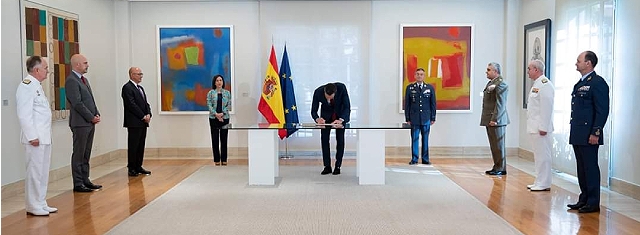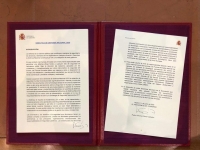Politics
Spain modernizes its Defense strategy prioritizing collaboration with NATO
Global security has changed

Sanchez signed the DDN document (Source: Government of Spain)
USPA NEWS -
The President of the Spanish Government, Pedro Sánchez, signed this Thursday the 2020 National Defense Directive, which, according to government sources, "represents a major update of the last document in this category published in 2012." The Directive, assures the Government, "incorporates elements of great modernity, trying to design a National Defense close to citizens and according to the challenges of the 21st century."
Since 2012, "the world security situation has evolved significantly," says the document signed this Thursday by the Spanish Prime Minister. "The crisis of COVID-19 or documents such as the Global Strategy of the European Union have changed perceptions about security in Europe and the way to manage it," he adds. For this reason, "Spain offers itself abroad as a responsible and supportive partner, fully committed to peace and improving global stability." Currently, Spain is a security provider with its own model, "which is based on respect for the sovereignty and idiosyncrasy of other peoples, on empathy in dealing with other populations, in the interest in Human Security as an element of conflict prevention, and in the experience of more than thirty years of participation of our Armed Forces in operations outside the national territory,“ underlines the document.
Among the main innovations included in the 2020 National Defense Directive are the promotion of the role of women within the Spanish Armed Forces and the need to apply effective multilateralism, "adding their own capacities to the effort for peace and stability of international organizations, mainly the European Union, United Nations and NATO.“
This is due to the fact that "the last decade has witnessed substantial changes in the international security architecture, which has resulted in a notable erosion of the international order and in an unusual role for the use of force," says the document signed this Thursday. And he adds that other threats such as terrorism, organized crime, climate change, pandemics and the security of digital networks deserve to be focused to preserve the western way of life and the security of citizens.
"In circumstances of withdrawal of the multilateral approach," explains the document, "the European Union must assume greater responsibilities. Much of the future of our security in the broad sense lies in the Union, where we make a decisive contribution to building a coherent and effective Common Security and Defense Policy. We want to remain in the leading group of Member States committed to the development of the instruments of the Union Treaty related to Security and Defense, in order to give this Common Policy greater visibility and effectiveness, increase and modernize military capabilities and strengthen the European industrial and technological base.“
This process, he adds, “will also serve to complement and reinforce the capacities of the Atlantic Alliance. We believe in a solid NATO, with a more cohesive and capable European component, an effective NATO in the face of challenges to citizens [from] any direction.“ Under the cloak of NATO or the mandate of the United Nations, Spanish action abroad "will be in concerted multinational frameworks, preferably in the areas of the United Nations, the Common Security and Defense Policy of the European Union or the NATO." The purpose, the Spanish Government points out, "will be to contribute to peace and, at the same time, to consolidate Spain as a reference partner and ally."
In peace operations, Spain will promote new formulas that try to avoid the stagnation of conflicts and enhance the agreement between the parties. Spain will continue to apply a stabilization model in which, by avoiding taxation, consensual and respectful solutions are promoted with the local population.
Liability for this article lies with the author, who also holds the copyright. Editorial content from USPA may be quoted on other websites as long as the quote comprises no more than 5% of the entire text, is marked as such and the source is named (via hyperlink).






